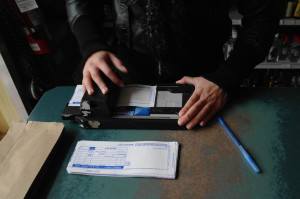October 1st, 2013 by Elma Jane
A payment card transaction involves some or all the following participants:
Acquirers or Payment Processors that market card acceptance services to merchants, obtain transaction authorization, and clear and settle card transactions for the merchant.
Consumers or Cardholders that use payment cards to purchase goods and services. Issuers that market and issue payment cards to consumers and set the terms and conditions for their use; Merchants that accept payment cards for the purchase of goods and services; Network Operator that oversees the system and coordinates the transmission of information and the transfer of funds between issuers and acquirers.
Since the network operators revenue depends on the value of transactions that flow through its network, it tries to ensure the widest possible acceptance among consumers and merchants. In order to increase use and acceptance, the networks use marketing techniques to gain brand recognition, create products that encourage consumer usage and merchant acceptance, and set fees and impose rules on system participants including:
Interchange Fees they are set by the network but are generally paid by acquirers to issuers and are usually reflected in the merchant service fee paid by merchants to acquirers. Interchange fees can be calculated either as a flat fee per transaction, as a percentage of the transaction value, or a combination of both.
Membership Requirements MasterCard and Visa require issuers and acquirers to be regulated financial institutions or be sponsored by a regulated financial institution. Interac also requires issuers to be regulated financial institutions.
Network Switch Fees these fees are charged to acquirers and/or issuers, and are set and collected by the network. They can be calculated either as a flat fee per transaction or as a percentage of the transaction value.
Merchant Acceptance Rule Includes:
No Discrimination Rules which prohibit merchants from encouraging consumers to consider (or steering consumers toward) lower cost payment instruments.
No Surcharge Rules which prevent merchants from charging consumers a fee for the use of a credit card rather than some other credit card or method of payment;
Honour-All-Cards Rules which require merchants that accept any of the networks credit cards to accept all of that networks credit cards (core, high spend and premium high spend in the case of MasterCard), regardless of the applicable interchange fee. The networks have also expanded this rule to include debit cards (i.e. if a merchant accepts one debitcard, they must accept all of that networks debit cards).
With four-party card networks, such as Visa and MasterCard, the card networks seek to maximize the transactions following through them by attacting more card issuers. The networks do this by offering the prospect of interchange income to issuers, thus creating an incentive to increase interchange as much as the market (i.e. the parties paying the interchange fees) will bear.
The ability to use credit cards and debit cards to purchase goods and services rests largely on a behind-the-scenes architecture of procedures, rules and technology that govern how funds and information are transferred between people and institutions in the process of settling accounts, i.e., of ensuring that merchants that sell goods and services get paid by the people who purchase them.
Posted in Best Practices for Merchants, Credit card Processing, Electronic Payments Tagged with: accept, account, acquirer, authorization, cardholder, credit card, debit, fees, interchange, issuer, merchant service, merchants, network, payment, processor, Rates, transaction
August 19th, 2013 by Admin
1. Use newer POS systems to reduce credit card fees.
2. Find out what percentage of your gross sales go toward credit card rates.
3. Perform a statement review at least annually.
Any time a customer uses a credit card to purchase services and goods the merchant pays various rates and fees processing those transactions. Most of these fees go to the bank issuing the credit card as they take on the bulk of the risk in credit card transactions. Visa, American Express and Discover own the network on which these credit card transactions are processed on and they receive part of the fee and percentage rate as well as establish these rates and fees. Finally the bank that provides merchant account services gets part of these rates and fees.
To a small business 2, 3, or even 4% might not sound like much but when these fees are on the gross total of sales they can be significantly higher than originally thought. For this reason it’s a great idea to assess your merchant account statement to see if rates are in line and that your most frequently used cards and transaction types are getting the best rate possible. By going over your statement, you can see exactly what you pay per transaction and get details about your most common transaction types and credit card used to get the process going. Knowing how to untangle the various levels of pricing rates and fees can be daunting if you don’t know what they mean. If you are unfamiliar with what these rates and fees mean on your statement companies like National Transaction can perform the review for you. Free of charge.
Ultimately the best thing to have is a merchant account service provider that will take the time to go over your business with an eye lowering your rates and fees. The savings can be significant. As a business grows it changes and there should be an ongoing strategy at maintaining the best processing rates and fees possible. Today with so many different credit card types, like rewards cards, airline miles programs and more it can pay off to check once or twice a year.
Posted in Best Practices for Merchants, Credit card Processing, Electronic Payments, Merchant Services Account Tagged with: account, American Express, bank, card, credit, fees, MasterCard, merchant, process, Processing, Rates, services, Visa MasterCard American Express
August 16th, 2013 by Admin
 Square credit card processing service was fined $507,000 by Florida’s Office of Finance Regulation for operating an electronic payment processing service without a money transmission license. Some may remember the same treatment in Illinois in March of this year. The order covers two years of operation and processing including Square Register, stored value and prepaid access credit card services.
Square credit card processing service was fined $507,000 by Florida’s Office of Finance Regulation for operating an electronic payment processing service without a money transmission license. Some may remember the same treatment in Illinois in March of this year. The order covers two years of operation and processing including Square Register, stored value and prepaid access credit card services.
Square was granted a money transmission license after it paid the fine via wire transfer and is now in compliance. Square neither admits or denies any wrongdoing. Although it’s an emerging field the Florida based fines show that adhering to state laws is a tricky situation that needs extra scrutiny on the processors end. Due to the state by state nature of the laws, credit card processing companies find themselves complying with each state’s independent regulation laws.
In a statement from Square.. “We worked with Florida to resolve our application and receive our license to operate as a money transmitter in the state, We look forward to continuing to help merchants across Florida grow their business with Square.”
Posted in Credit card Processing, Electronic Payments, Mobile Payments, Mobile Point of Sale Tagged with: account, credit card, Florida, merchant, merchants, Processing, Square
Businesses looking to make an impact on their bottom line should take a look at the way they process electronic transactions. Today consumers view their transactions as an experience gravitating toward convenience. Long lines at the cash register can often turn away customers, sending them to competitors who might have more convenient ways to pay and therefore shorten time spent to complete the purchase. Impulse buyers are another reason to make sure that transactions go as smooth as possible increases the chance of future purchases. Read more of this article »
Posted in Electronic Payments Tagged with: account, application, electronic payments, electronic transactions, fees, merchant, process, process transactions, Processing, Rates



